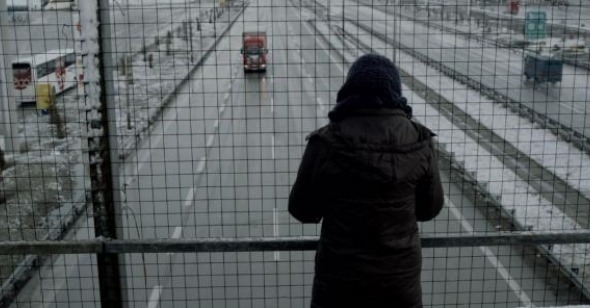On the Threshold
by Benjamin Mercer
Araf
Dir. YeĹźim Ustaoglu, Turkey, no distributor
The Turkish film Araf, the fifth feature by writer-director Yeşim Ustaoglu, arrives on these shores accompanied by the subtitle Somewhere in Between. As befits that translation of the original title, it’s set in a total non-place: an industrial town in the center of Anatolia that’s starved of any meaningful prospects. Which is not to say that the movie itself seems anonymous—Ustaoglu has made an exquisitely languid coming-of-age story, which she shoots through with a lyrical rain-on-window realism. Throughout, the filmmaker works in a style not dissimilar from—though less droll than—that of Nuri Bilge Ceylan, the best-known Turkish director in the U.S., whose Once Upon a Time in Anatolia graced the New York Film Festival main-slate lineup last year. The two filmmakers diverge in their thematic concerns, but there seems to be overlap in some of their aesthetic ones: a fluid rendering of the local color (or lack thereof), built out with passages of brooding poeticism. The delicate evenness of Araf’s tone, though, all but dissipates as the film reaches its later stretches.
As the film gets under way, it revolves mostly around a rest-stop cafeteria where many of the central characters work: the protagonist, Zehra (Neslihan Atagül), who plans to leave her sludge-choked shithole of a hometown at the first opportunity; her contemporary Olgun (Baris Hacihan), a YouTube-era wannabe daredevil who, amid troubles at home, concocts ridiculous audition-tape stunts in the hopes of being invited to appear on the game show Deal or No Deal and who’s hopelessly in love with Zehra (she only occasionally repays his full attention with hers); and Derya, an older friend of Zehra’s who appears to the younger girl as the closest thing around to a model of liberated womanhood. Derya lives alone, under the pretext of having a husband, and Olgun, for his part, disapproves of Zehra spending so much time with a woman of such loose morals.
Over the course of one chaste sleepless night following a wedding, Zehra gets acquainted with the much older man who will eventually become her lover, the long-haul trucker Mahur (Özcan Deniz). She begins watching him yearningly as he stops off at the restaurant. A ways into the film, after a number of these pregnant glances have been exchanged, the two consummate their affair. Ustaoglu imbues Zehra and Mahur’s sex scenes with a half-lit tenderness that betrays a bit of sadness, if not any real alarm, at what’s transpiring between them (in these earlier passages, the film is appealingly even-keel). Clearly intoxicated with physical desire, Zehra also finds that, in Mahur, she has grabbed on to something outside the confines of her hometown; man-of-few-words Mahur makes a fitting screen for her wider-world projections because he seems to exhibit no real qualities beyond a weary tenderness. One might wonder, consequently, if Mahur—who is after all the object of a pointedly adolescent infatuation—is intended to be something of a man-child, simply browbeaten by a lifetime of disappointments, or else existing in total surrender to his constant-movement highway routine. (In several scenes, Ustaoglu shows him behind the wheel, blank-faced, weathering various elements as he cuts down a narrow ribbon of tarmac.)
Eventually, Mahur disappears from the movie, never to return, and Ustaoglu shifts gears rather unexpectedly. Once we see Zehra administering a pregnancy test at Derya’s home, the path the film lays out begins to seem clear enough. Her result is positive, and after this she becomes a prisoner of her strict culture and harsh surroundings to a much greater degree; in accordance, the movie turns up its emotional volume. During a proposal of marriage, a distraught Zehra confides her situation to Olgun, which sends him into a rage in which he end up firing a pistol at nothing in particular. Zehra’s agony reaches a fever pitch in a clinic-bathroom sequence that must be an instant contender for the most shocking scene of the decade. It feels like Ustaoglu has taken a shortcut directly to her core point—counterposing the freedom of movement available to men with the restrictions put on the female body by a patriarchal Turkish society.
But the filmmaker also makes sure to show that none of her characters will likely be able to bridge the gap between their current situations and the hopes and dreams that sustain them (a Deal or No Deal appearance, a ticket out of town, etc.). Ustaoglu establishes this on a placid, intimate scale, only to watch that gulf widen as the tone gets more urgent, on the way to a conclusion that seems almost like an afterthought. Little surprise, then, that this often beautiful movie fails to cohere—and that the characters, whom the filmmaker had succeeded in setting off against the featureless terrain, only seem to recede into that no-man’s-land background as the heavy incidents pile up.
